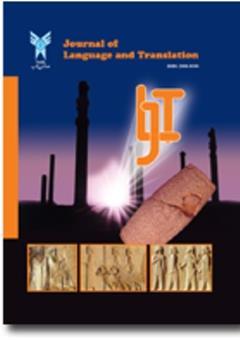An Evaluation of English Textbooks Taught in Iranian Secondary High Schools from the Processability Theory Perspective
محورهای موضوعی : نشریه زبان و ترجمه
Amir Hamzeh Gholami
1
,
Abbas Bayat
2
,
Peyman Rajabi
3
![]()
1 - Department of English Language, Malayer Branch, Islamic Azad University, Malayer, Iran
2 - Department of English Language, Malayer Branch, Islamic Azad University, Malayer, Iran
3 - Department of English Language, Malayer Branch, Islamic Azad University, Malayer, Iran
کلید واژه: The Processability Theory, Teachability hypothesis, book evaluation, pedagogical progression,
چکیده مقاله :
Pienemann’s Processability (PT) Theory is on the assumption that there is a limit on the human’s short term memory and processing capacity. On the one hand it means that those language structures which need a higher processing should only be produced in later stages of second language acquisition. On the other hand it means that what is presented to second language learners has to in line with their current level of proficiency. The present paper was an attempt to see if the English textbooks (Vision 1, 2, 3) taught in Iranian secondary high schools follow the developmental stages offered by PT. It also aimed to see if there was a smooth pedagogical progression from the first grade to the third grade in these textbooks. The findings showed that they only were successful at stage 1 of PT. In other words, they were more concerned with presenting word and phrases but when it came to other stages of the PT three major deviations were noticed: A) the early presentation of question forms before SVO structure is well-established, B) mixing the stages of PT, and C) omission of some intermediate stages. With regard to the second purpose no smooth progression was seen from grade one to grade three. For example, while Vision 1 introduces subordinate clauses, surprisingly, a year later Vision 2 presents countable/uncountable words like “some, many, a few, a little...” which, according to PT, are a lot easier to process than complex sentences containing subordinate clauses.
Pienemann’s Processability (PT) Theory is on the assumption that there is a limit on the human’s short term memory and processing capacity. On the one hand it means that those language structures which need a higher processing should only be produced in later stages of second language acquisition. On the other hand it means that what is presented to second language learners has to in line with their current level of proficiency. The present paper was an attempt to see if the English textbooks (Vision 1, 2, 3) taught in Iranian secondary high schools follow the developmental stages offered by PT. It also aimed to see if there was a smooth pedagogical progression from the first grade to the third grade in these textbooks. The findings showed that they only were successful at stage 1 of PT. In other words, they were more concerned with presenting word and phrases but when it came to other stages of the PT three major deviations were noticed: A) the early presentation of question forms before SVO structure is well-established, B) mixing the stages of PT, and C) omission of some intermediate stages. With regard to the second purpose no smooth progression was seen from grade one to grade three. For example, while Vision 1 introduces subordinate clauses, surprisingly, a year later Vision 2 presents countable/uncountable words like “some, many, a few, a little...” which, according to PT, are a lot easier to process than complex sentences containing subordinate clauses.


